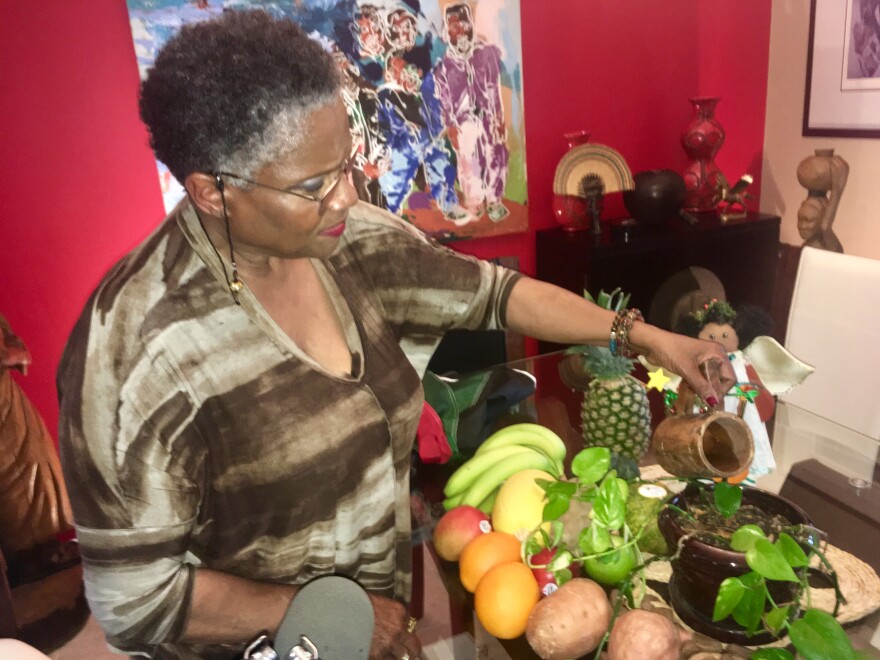December 26 at St. Stephens Community Church in Lansing, many will celebrate the first night of Kwanzaa. The weeklong observance honors African heritage. Observers also believe Kwanzaa can help people all backgrounds build a better community together.

On a gray, winter day in Michigan, color and warmth greet me inside the North Lansing home of Dr. Maxine Hankins Cain and Dr. Eugene Cain. Inside, there are paintings reflecting black American heritage, multi-colored cloths and artwork from Africa.
Dr. Maxine Hankins Cain is setting up the living room table with different kinds of fruits, nuts, and candles.
Some basics about Kwanzaa, which Black Power activist Maulana Karenga founded in 1966.
“He felt that people, especially in the diaspora, needed some things to hold to encourage them," said Dr. Hankins Cain. "So he developed the 7 principles of Kwanzaa.”
Kwanzaa Celebration - Wednesday, Dec. 26 6pm - St. Stephens Community Church 1007 Kimberly Drive, Lansing
The weeklong observance starts on December 26 with the first principle of Unity also known in the Swahili language as Umoja. Observers strive to maintain unity in families and community.
“The second day is called Kujichagulia with means Self-Determination, to define and name ourselves as well as the create and speak for ourselves," said Dr. Hankins Cain. "That third day is Collective works and responsibility. Ujima."
The fourth day of Kwanzaa is similar to Small Business Saturday which follows Thanksgiving. Ujamaa means cooperative economics... encouraging the community to build and maintain stores together.
The fifth day is Nia, which Dr. Hankins Cain said inspires people to explore their purpose in life.
“Revisit this – what is our purpose in life? Why do you exist? What good will you do while you are here on Earth?”
Seven principles of Kwanzaa: Umoja (Unity), Kujichagulia (Self Determination), Ujima (Collective Work and Responsibility), Ujamaa (Cooperative Economics), Nia (Purpose), Kuumba (Creativity), Imani (Faith)
The sixth day is Kuumba when Creativity is welcomed and leaving the Earth a better place than the one you were born into is encouraged.
The seventh day and principle of Kwanzaa are Faith.
“Imani.. which means to believe in all your heart in your people, your parents, and your teachers, your leaders and the righteousness and victory in our struggle," said Dr. Hankins Cain.
Dr. Eugene Cain is the retired administrator of the El-Hajj Malik El-Shabazz Academy in Lansing. He has seen young people change after learning and celebrating Kwanzaa.
"Young people who used to come to our home for Kwanzaa, young men especially - none of them are in jail," said Dr. Cain. "They are leading productive lives. And I think that those moments in which they were here celebrating Kwanzaa with our family and friends and others in the community, it helped broaden their perspective on life especially as to what is their purpose. Is to serve or is it to receive?"
Observers say Kwanzaa is not a religious ceremony. But there are rituals and symbols. Dr. Hankins Cain said what’s being placed on the table and it ties directly to the first fruits of the harvest in Africa.

"I have yams, potatoes, sweet potatoes," said Dr. Hankins Cain. "All of these things represent the harvest - which was planted and now is being harvested."
Ancestors are honored as well as the future. Each child is represented by an ear of corn.
In the center – is a wooden candleholder called a Kinara – a candle for each day and principle is lit. Dr. Hankins Cain said Kwanzaa is more relevant in 2018 than it was in 1966 when it started.
"As we are challenged – locally, nationally and internationally – where our children are not being educated at the level where they should be, where too many of us disproportionately are imprisoned, where unemployment isn’t really where they say it is, where families are being separated at the border... We need to unite in a way that is going to bring about positive changes in this world and when we come together and communicate and talk," said Dr. Hankins Cain. "I think that’s when we can talk and solve problems."

"I see it as a part of developing ones character, self-esteem and also establishing a focus of control about your environment, who you are and what you are able to do," said Dr. Eugene Cain.
Wednesday night, The Cains will lead a Kwanzaa festival on Wednesday, December 26 at 6:00 p.m. at St. Stephens Community Church in Lansing. It will include the table setting, poetry, music, and everyone will be encouraged to chant “Harambe” seven times, for unity.
"Harambe means to pull together," said Dr. Hankins Cain. "We need to pull together. We are too divided on too many fronts. We need to unite and we need to pull together that’s how we are going to collectively grow."



